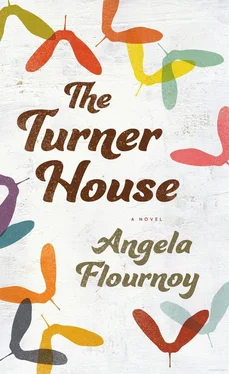“I don’t know if I’d say he was depressed. Since when did you decide he was depressed? Alice help you with that?”
The dry-erase board held a to-do list, which Cha-Cha watched Francey check off and strike through.
Juice leftover apples ✓
Soak and clean juicer ✓
Kyle bday present
Look into Head Start for Bobbie?
Breathe! ✓✓✓✓
Smile!! ✓✓
Who needed a reminder to breathe? Cha-Cha was certain the last two entries were for his benefit, Francey’s way of communicating that she had larger and more important concerns than he did, or that life was too short to not smile, or to take it “one breath at a time,” or some other Francey-approved feel-good slogan. She wore black stretch pants hiked up to the middle of her loose, smallish belly, a teal tank top tucked into the stretch pants, and white aerobic shoes. Somebody’s athletic, health-obsessed granny, Cha-Cha thought. She probably weighed 150 pounds now, but just as Cha-Cha had to reconcile Viola’s current physical condition with his own memories, he often had to do the same with this thin woman before him. Francey had been large for most of their adult life, 350 pounds at her heaviest. Nearly ten years had passed since she lost more than half of herself, thanks to bariatric surgery and a lot of juice.
“I know depression exists,” Francey said. “I’m not one of those old black ladies who doesn’t believe in mental health, but the threshold has gotta be different for different eras. Lots of folks had a bunch of kids back then; it’s just what they did. Mama was one of ten herself. And remember, Mama and Daddy’s parents and grandparents were sharecroppers. Shoot, sharecropping killed Daddy’s father. And their great-grandparents were probably born slaves. Slaves , Cha. What’s a big family and a crummy job in Detroit when you’re only two generations or so outta the fields?”
Slavery. Did there ever exist a more annoying way to try to make a modern-day black man feel like his troubles were insignificant, that he should be satisfied with the sorry hand society dealt him? Cha-Cha thought not. The line of reasoning was faulty; it was precisely because his grandfather’s father was born a slave that he should expect more from life, and more from this country, to make up for lost time at the very least.
“I’m not comparing anything to slavery, Francey, come on,” Cha-Cha said. “And I don’t know nothin about thresholds. Let’s keep it simple: Daddy was sad a lot. And he drank too much. Can you admit that?”
Francey threw up her hands.
“I don’t know, Cha-Cha, sure. But he wasn’t no raging drunk. He wasn’t in the house raising hell, hitting his wife and children. You make it sound like he was abusive.”
“I never said that.”
Cha-Cha’s plan had been to come to Francey’s, hook up her filtration system, and ask her about his haint. He’d even brought a book, Zora Neale Hurston’s Mules and Men , which the Internet told him mentioned both black folks and ghosts. He hadn’t come here to talk about depression, or Francis Turner. Now Cha-Cha was irritated. It was frustrating, the way his siblings worshipped their parents. What part of their worlds would crumble if they took a good look at their parents’ flaws? If there was no trauma, why not talk about the everyday, human elements of their upbringing? Call a spade a spade.
Cha-Cha drank down the rest of his water.
“Alice says my role in the family is kinda like the prime minister of England.”
Francey chuckled.
“Cha-Cha, if this woman is helping you, then great. But I don’t know if I can stand to hear any more of her ideas.”
“You gotta let me explain before you laugh at me. Now, she says I’m like the prime minister cause I handle the everyday business of the family, but when people think of who runs the family, who is the symbol, they think of Mama.”
“As they should,” Francey said.
“Okay, but the thing is, being the prime minister means you handle all the ugly stuff that the royal family doesn’t really get into. Like, me and Daddy worked together, remember? So you would think that back when I still lived on the east side we would carpool when we both were doing short runs, but we never did. He said he liked to drive alone. But Mama stayed on me to make sure he came straight home after work. Daddy knew I tailed him home in my truck. What he’d do is park across from the basketball courts on Lambert and throw back a couple of those small bottles of Miller Lite, remember he used to call them short dogs? Then he’d drive home, and I’d follow him into the house like nothin happened.”
“But what does that have to do with anything?”
“Why do you think Mama made me do that?”
“You know why. So that everybody didn’t have to see him drinking.”
“Exactly. But what about me , Francey? Wasn’t I his child too?”
Francey made a sound somewhere between a chuckle and a snort.
“You know, I took a psych class or two in school, and I can tell you this much: if this Alice person is encouraging you to do anything other than get over it , she’s wasting your money. You were already grown , Cha. And what does it matter to you now, old as you are, that your daddy drank too much and your mama delegated too much onto you and onto me? Don’t act like you were just the prime minister and I was off in the countryside not helping out. Lord, I don’t even like this metaphor, and here you got me using it! I helped out until I couldn’t anymore. You know that. Don’t act like you don’t.”
Up until her bariatric surgery Francey had been just as involved as Cha-Cha in settling familial squabbles, remembering birthdays, looking after Viola, opening up her home to down-on-their-luck nieces and nephews, and providing leadership in countless other ways. Cha-Cha was still not sure why the rest of his siblings didn’t do more for Francey following her operation. Maybe opting to have the surgery was too decisive a step among a family of people who talked about improving their health but generally left the things that ailed their bodies and minds unattended. Francey contracted an infection after the operation and was hospitalized for nearly a month. None of her siblings visited more than once, save for Cha-Cha, who, in part due to Tina’s insistence, had visited almost daily. After she got well and got skinny, she distanced herself from all familial obligations. She remained cordial, and social, and it was clear she still loved them all, but there was no more hand wringing over other people’s problems, no more open-door policy to relatives in need of money or beds. She wouldn’t even offer a ride to the airport.
“Oh, come on, Francey. I’m talkin about myself right now,” Cha-Cha said. “I never said you weren’t there. You helped out too when we were comin up, and I was there for you when you needed it, so don’t try to make me feel guilty.”
“You know what,” Francey said. “Richard’s gonna be back soon. Seeing you up in here with your tools and stuff makes him embarrassed about his electricity phobia thing.”
Cha-Cha made no move to leave. This morning he and Alice had talked about how he thought Turners were prone to addiction. There was Francis, who Alice had called an alcoholic, but Cha-Cha thought the word was too clinical to truly convey the sort of secret, sad drinker Francis was. He took no joy in his drinking; it was as if he drank to punish himself for some past misdeed. There was Lonnie, no longer little and peeing in the hallway, but he had dabbled in heroin as young as thirteen and was clearly still on something, Cha-Cha didn’t want to know what, at the age of fifty-three. Troy, bless his heart, was obsessed with success, but he hadn’t figured out how hard work begot it. There was Marlene, and with her Viola Turner herself, not really hurting anyone with their obsession, Cha-Cha supposed, but there had been a decade or so when they were downright absorbed with that flea market stall, even through Marlene’s chemotherapy, and despite never having turned a profit. The duo had scoured the Midwest for things. Cha-Cha never understood their need for things to sell just to say they had them to sell—fur coats, vintage pocketbooks, lamps. There was Cha-Cha’s own wife, not a Turner by blood, but thirty-odd years rubbed off on people. He felt a pinprick of guilt calling Tina’s church involvement an addiction, but that’s how he thought of it. Now here was Francey standing before him, obsessed with nutrition and vegetarianism and kitchen gadgets. Turners seemed incapable of doing anything in moderation. Maybe Cha-Cha himself was addicted to being in charge of the family, or to going to therapy with Alice, or even this revived idea of a haint. Well, he wouldn’t let his obsessions get the best of him; he would take them apart and figure out where they came from. He pulled his book from underneath his bag of tools.
Читать дальше












